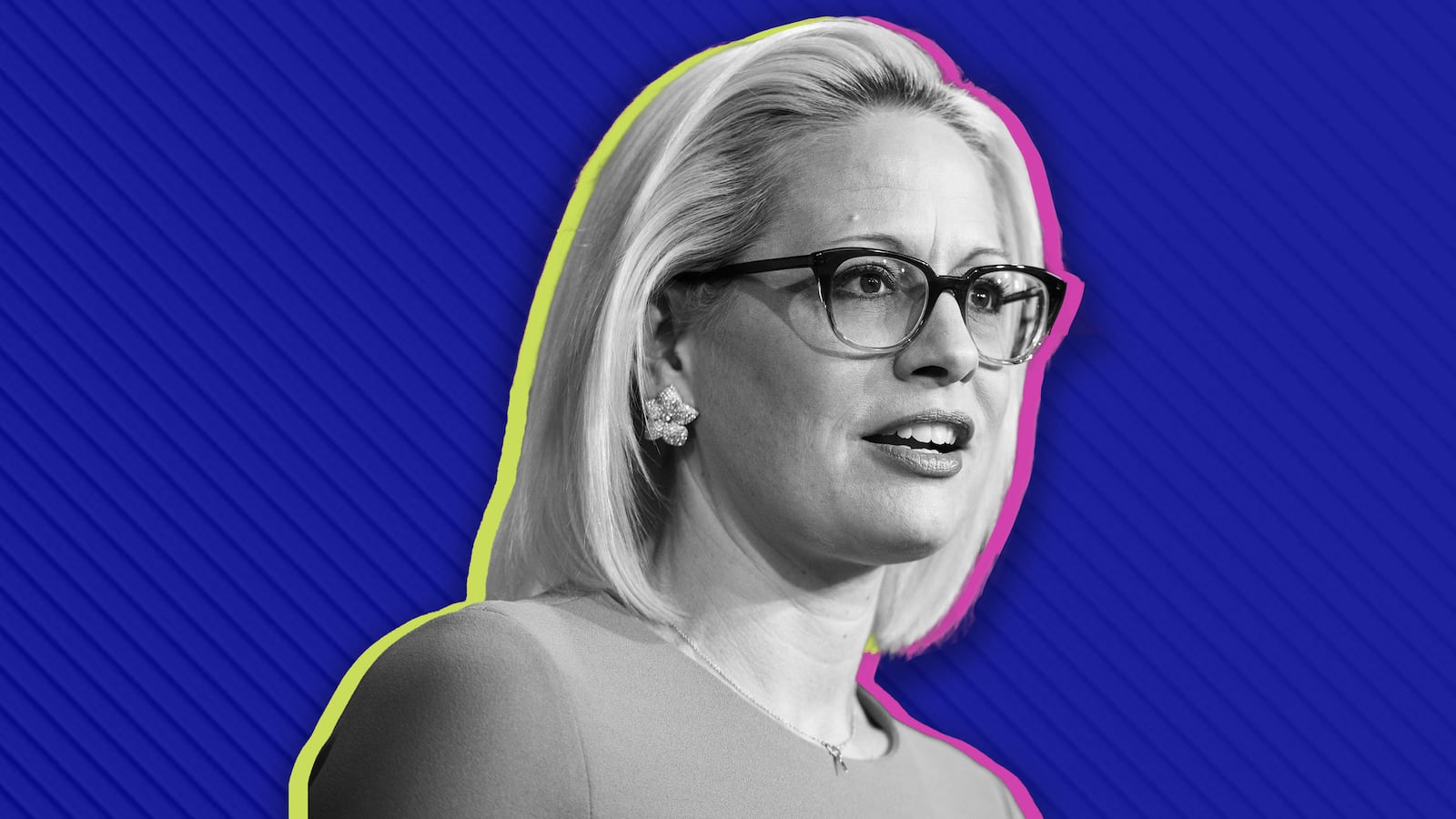Sen. Kyrsten Sinema is facing a fresh round of attacks from progressives aiming to turn up the pressure on the moderate Democrat back home and push her leftward on their most burning issues.
Just Democracy, a coalition of advocacy groups run by progressive Black and brown organizers, is launching a new six-figure advertising campaign targeting Sinema, hitting cable stations in her home state of Arizona on Wednesday.
The ads, seen first by The Daily Beast, are so blistering that a viewer might momentarily forget that Sinema is not up for re-election until 2024—and that the ads are paid for by Democrats, not Republicans.
In one ad, a man named Tom, identified as a retired Navy veteran, tells Sinema in a direct-to-camera harangue, “you don’t have the political courage to do what’s right for Arizona!”
In another ad, a Phoenix pastor named Reginald Walton says to Sinema from the pews, “since going to Congress, you’ve become the problem.”
The campaign focuses on Sinema’s resistance to changing Senate rules to advance the party’s agenda—like the For The People Act voting and elections bill—over unified GOP opposition. She and Sen. Joe Manchin (D-WV) are the most vocal remaining opponents to modifying the 60-vote threshold for passing legislation in the Senate, which have made them targets of progressive activists on the national level and in their home states.
This is Just Democracy’s second offensive against Sinema this summer: in June, they spent $1.5 million on a TV ad campaign criticizing her on many of the same issues.
So far, Sinema has brushed off these pressure campaigns, and has, if anything, grown more staunch in her resistance to budging on the filibuster and other issues, even as her fellow Democrats grow more desperate about their prospects of passing voting legislation and other key items. A sign of that came on Monday, when over 30 people, including civil rights activist Jesse Jackson, were arrested in a protest at Sinema’s office in Phoenix.
Sinema’s office declined to comment on the Just Democracy ad campaign.
Beyond voting rights and the filibuster, the attacks also capitalize on a pair of high-profile moments where Sinema broke with many liberals or just straight-up angered them. One ad makes use of the footage of Sinema giving a now-viral thumbs-down to legislation raising the federal minimum wage to $15 in February. Another ad highlights her absence from a vote to create an independent commission to investigate the Jan. 6 attack on the Capitol.
The ads play on Sinema’s pragmatic pitch to Arizona voters that helped her win a tough 2018 race, arguing that her opposition to changing Senate rules amounts to breaking those campaign promises. “Instead of getting things done,” says Walton, “your defense of the filibuster is causing more gridlock.”
One of the ads’ attacks on Sinema’s “standing with the GOP” also comes as the senator takes a lead role in brokering a bipartisan infrastructure deal, which, if successful, would give her an argument that the Senate can still function.
While attacks from the left mean something in Arizona, a battleground state carried by Joe Biden in 2020, Sinema is working hard to cultivate a brand like that of the late Sen. John McCain (R-AZ) as an independent who sometimes frustrates both parties but lives in the political middle.
It’s unclear how much of the sustained attacks on Sinema are influencing Arizona voters’ attitudes one way or the other. A new poll conducted by Global Strategy Group for the anti-filibuster group Fix Our Senate—and shared with The Daily Beast—provides at least one data point. In a survey of 500 registered Arizona voters, one-third said they had heard something about Sinema’s stance on the filibuster recently, a fairly high number on a specific issue in an election cycle when Sinema is not on the ballot.
The poll also found Sinema’s approval rating dropping from 41 percent to 34 percent from May to July, with her disapproval rating rising from 27 percent to 31 percent.
A recent Data For Progress poll showed Sinema lagging behind Sen. Mark Kelly (D-AZ), who is a top target for Republicans in 2022, in approval ratings among Democratic and independent voters.






